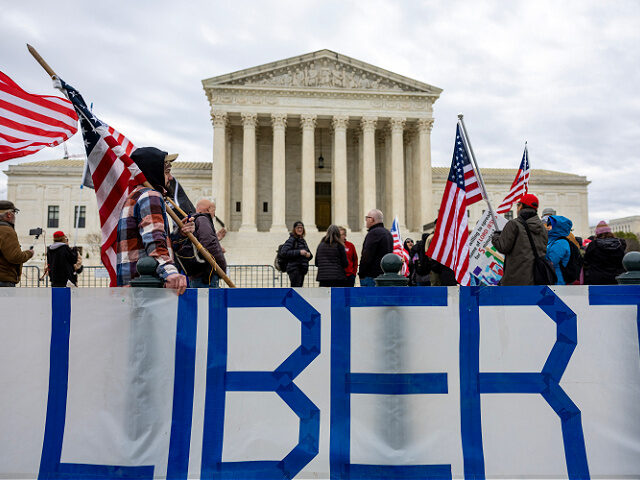Constitutional scholar Jonathan Turley opined at the Hill saying that Friday’s Supreme Court decision holding that the most severe law cited in January 6 prosecutions does not apply to riots or protests effectively means that the oft-repeated accusations of “insurrection” have been downgraded to mere trespassing.
As Breitbart News reported this past Friday, the Supreme Court decided in Fischer vs. U.S. that the “Department of Justice had taken too broad a view of [18 U.S.C.] 1512(c)(2), a law that prohibits destruction of evidence but was not intended for protests.”
It should be noted that there is a federal insurrection statute, found at 18 U.S.C. 2383, but few if any January 6 rioters were ever charged with that. Instead, the most serious charge they were hit with was under Section 1512(c)(2), which is about obstructing an official proceeding by destroying or hiding documents meant for use in that proceeding.
“Unless the defendants could be shown to have interfered with the delivery of documents to Congress, they could not be prosecuted under the statute — as hundreds of people, including former President Donald Trump, have been,” noted the report.
Most strikingly, Justice Ketanji Brown Jackson — a liberal judge appointed by President Joe Biden — sided with the conservatives, while Justice Amy Coney Barrett, appointed by former President Donald Trump, sided with the liberals.
As Turley argues in his lengthy op-ed, the decision will have ramifications that could affect hundreds of cases pertaining to January 6:
For years, calling January 6 an “insurrection” has been a litmus test for press, pundits and politicians. Members of Congress such as Eric Swalwell (D-Calif.) claimed a conspiracy of “armed and organized insurrectionists.” The claim is legally absurd but politically advantageous.
The Fischer opinion will bring an end to a minority of cases that were based entirely on the charge under 1512(c)(2). The section had been enacted after the Enron scandal in 2001 with the collapse of an energy company accused of corporate fraud. It was designed to allow criminal charges for the destruction of evidence in the form of documents and records.
The Justice Department chose to interpret that provision to broadly include any obstruction of any legal proceeding, and then used it in hundreds of Jan. 6 cases. At least a quarter of the prosecutions included this charge. Most also included other charges, including trespass and unlawful entry. A small number involved serious offenses like violence against officers and an even smaller number involved charges for “seditious conspiracy.”
Though Turley noted that criminal charges of some kind should have pursued for some of the January 6 offenders, especially the violent ones, he declared that Supreme Court’s decision shows that the Justice Department pursued wrongful prosecutions on the obstruction charges. In fact, DOJ official Michael Sherwin somewhat admitted to that in a television interview in which he said, “Our office wanted to ensure that there was shock and awe.”
“It worked because we saw through media posts that people were afraid to come back to D.C. because they’re, like, ‘If we go there, we’re gonna get charged,'” said Sherwin. “We wanted to take out those individuals that essentially were thumbing their noses at the public for what they did.”
The Supreme Court decision will also likely effect Special Counsel Jack Smith’s four charges against former President Donald Trump pertaining to January 6. Smith, with the backing of Judge Tanya Chutkan, has charged the former president with obstruction of an official proceeding, conspiracy to obstruct an official proceeding, conspiracy to defraud the United States, and conspiracy against rights. Given the SCOTUS decision, at least half of the indictments will be dropped while Smith seeks a superseding indictment.
The case is Fischer v. United States, No. 23-5572 in the Supreme Court of the United States.
Paul Roland Bois directed the award-winning Christian tech thriller, EXEMPLUM, which has a 100% Rotten Tomatoes critic rating and can be viewed for FREE on YouTube or Tubi. “Better than Killers of the Flower Moon,” wrote Mark Judge. “You haven’t seen a story like this before,” wrote Christian Toto. A high-quality, ad-free rental can also be streamed on Google Play, Vimeo on Demand, or YouTube Movies. Follow him on X @prolandfilms or Instagram @prolandfilms.

COMMENTS
Please let us know if you're having issues with commenting.